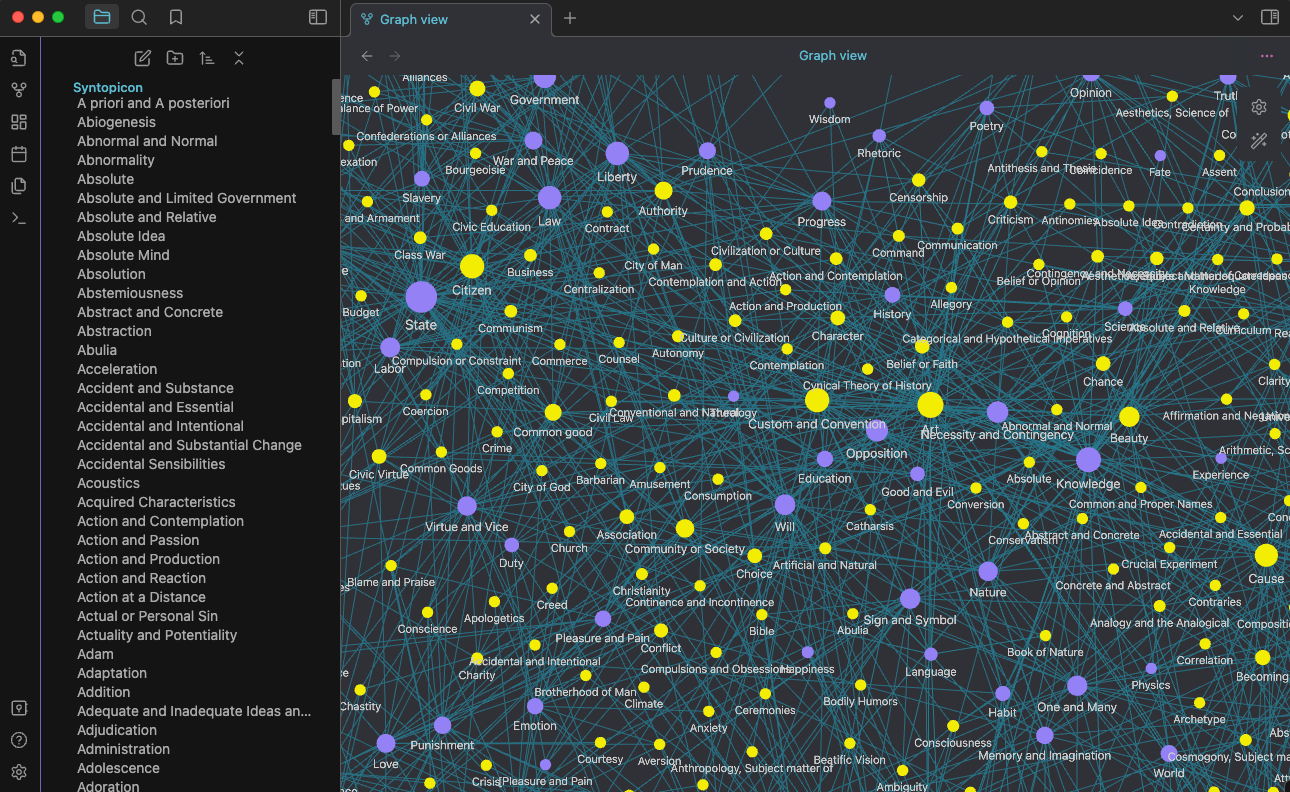Day 86, 182 to go until I’m unemployed. Not much BSU news today. I need to remember to turn in my expense report for my trip to the conference in Canada, before my credit card bill is due. And I have a status meeting with the people overseeing my Z-Degree Exploration grant in about a week. So I need to work up a bit of a report.
In other news, as I said I might do, yesterday I started putting The Syntopicon’s index of keywords into Obsidian. It’s a bit time-consuming adding about 1,800 terms and anywhere from one to a dozen links, so I’ll do it in stages over several days. I got A through C completed yesterday. I think it’s going to be interesting, because the graph should allow me to easily see not only which of the 102 “main ideas” each keyword connects to, but hopefully some connections between the keywords themselves that doesn’t only happen via the main ideas.
The way the graph is shaping up, I imagine each of the 102 main ideas is already represented. It has been a while since I’ve had to add a new link term. Many of them are currently empty (purple) nodes, since I haven’t taken the time to fill in each of them as I’ve added them. But I’ll reach them all eventually, as I work my way through the alphabet, and then they’ll light up as prominent connections, with clusters of keywords around them. It will also be interesting to see how the keywords create bridges between the main ideas. The way the “forces” are set on my graph, a connector tends to pull two nodes closer to each other. More connectors pull them even closer. So that might give me some sense of the relative relatedness of different ideas, in the space.
I’ll probably make a video for Lifelong Learners in the next couple of days, as I’m working on this, so people can see what I’m talking about and how to actually do something like this in Obsidian. There has been a suggestion that I might want to make this accessible to others. I’ll think about a way to do that. I let me subscription to Obsidian Publish lapse, so I may consider getting that back (that was one of the things that was member-supported, and I’ve been getting some paid subscriptions so I may be able to swing that). I might also turn the Syntopicon Index into a separate folder and just make that available on Dropbox for people to download and play with. I haven’t quite wrapped my mind around the idea of making it a completely user-editable public space. This has worked fairly well on a small scale, such as with the shared vault we use in my book club. But that’s a trustworthy group. Any problems we’ve had with that vault have been strictly accidents and easily corrected. I’m not sure I want to police a truly public vault, or negotiate what types of edits are acceptable and what will ruin the experience for others. Might be more useful for people to make their alterations and then share out their own modified vaults. If anyone has suggestions, let me know!





Opening it up as a publicly editable space is a nightmare unless there is a system like Wikipedia in place, where all edits are submitted by registered users and then validated by a select group of editors. I wish Wikipedia worked like an appliance for things like this. Imagine setting up a new Wikipedia and assigning editors, then letting it loose. There is always the possibility that it will scale beyond the capacity of the editors, however.
BTW, are you familiar with The Society Library? "Modeling societal-scale deliberation, developing decision-making models, building libraries of knowledge, and offering educational content on complex issues." I've been following them for a short while and I thought, is there something useful they do that might be applicable to lifelong learning? https://www.societylibrary.org/mission-vision
"The Society Library extracts arguments, claims, and evidence from various forms of media to compile databases which represent the ideas and arguments from all points of view starting with the most high-impact, persistent, and polarizing issues; to be visualized and made freely available to the public in a library. The long-term vision of the Society Library is to create a library of ideas not only on social and political subjects, but also philosophy, spirituality, and social values."